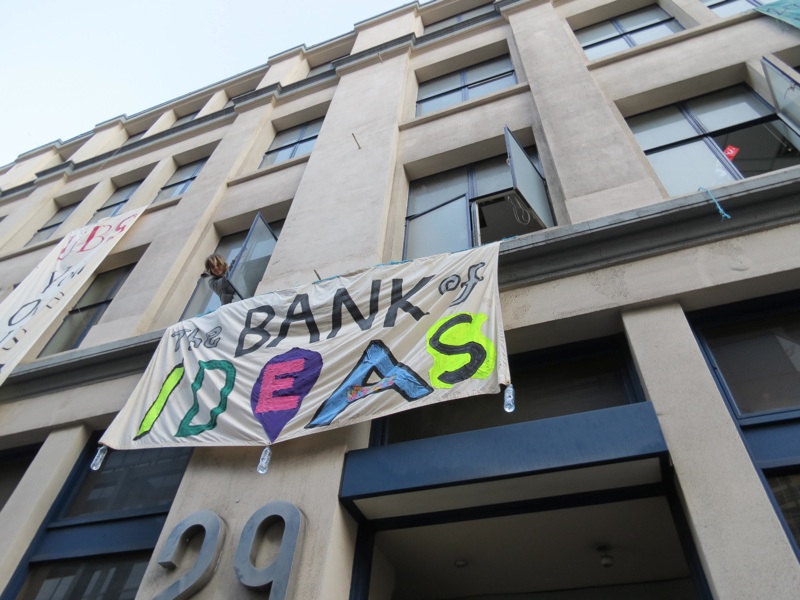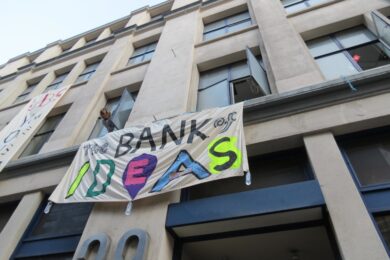One of the guys in dreadlocks catches my glance as he turns to go back upstairs.
“Hey man, social dreaming review starts in ten minutes if you’re interested.”
When my questioning pause makes it clear I’m new around here, he continues: “Social dreaming. We’ve been writing down all of our dreams since the beginning of the movement, and now we’re going to share our all those thoughts and feelings and learn from them as a community.”
I don’t follow him up to join the meeting, but I can’t help noticing that he leaves bearing the same gaze you find on most residents of the Bank Of Ideas as they go about their business. It’s somewhere between exhausted and beatific; it’s a constant acknowledgement of hard-fought success and a preparation for some kind of impending social martyrdom.
The thing is, those grave stares are almost never followed by a discussion about the ills of capitalism, or the white-collar crimes committed by multi-billion pound financial institutions. The lectures on economics, political science and environmentalism that once took place here have been phased out of the daily programming. Aside from poorly written pamphlets strewn about the floor or handwritten signs taped to the walls, the modus operandi of Occupy London seems strangely absent.
As I walk around the squat that was, amidst complex legal battles and media scrutiny, built triumphantly from scratch within a UBS office building a month ago, I don’t feel as if I’m witnessing a beating heart at the core of one of this generation’s great social struggles.
Depressingly, but perhaps inevitably, it feels more like reality television.
I remember first showing up to the Bank of Ideas as a wide-eyed supporter soon after its inception in mid-November. Like so many other comfortably middle-class, college-aged demonstrators taking part in their first protest, it was appealing to me not only because of the building’s symbolic importance but also what was, quite honestly, a sense of boyish excitement. I’d been smacked by a cop during the confused struggle of the first night at St. Paul’s; I’d written a wildly passionate opinion piece in defence of the movement once it started hitting the rocks of public opinion; I’d camped out in a police station with nothing but new friends and my camera. But a squat! Gee-fucking-whizz! I showed up to listen to talks by some white-haired socialist professors, lent a hand here and there, didn’t shower, smoked cigarettes on the roof, and figured it was just about the most effective way to go about exposing the way corporate power structures have developed a stranglehold on democracy.
And what I realise now is that, regardless of the naïve stupidity of my own perspective at that time, the squat really did serve as a vital place at which to congregate for major decisions, as well as creating a small example of a society sans corporate influence. The problem now lies in the fact that, a month later, the substance is gone. Even the rhetoric – buzzwords like the villainous “neo-liberalism” and the heroic “99 percent” – seem spent, giving way to petty arguments about how to allocate kitchen supplies or deal with resident nuisances, whether violent or verbal.
“It’s all theatre”, says Bryn Phillips, as I help him move his air mattresses and desk into a fresh new room in the basement of the building. He’s been living at the Bank Of Ideas for weeks and is one of the only people I’ve met here who remains focused on the original objectives of the Occupy movement. As the head of the City Of London Corporation working group, Bryn isn’t usually present at general assemblies and group meetings because he’s busy doing research on the corruption of the City’s major financial institutions.
While we arrange what will also be my place to sleep, he tells me that living at the Bank doesn’t even hold any special meaning to him anymore. “I’m just here because I haven’t got a flat,” he quips, dragging in a new heater – his second – which he’s just found on top of a rubbish pile outside the room. It gets incredibly cold in the basement, and Bryn’s made the move down the hall mainly because now he won’t have to use an extension cable anymore in order to plug them in. He’s still the only one who lives down here. The pamphlets, the dirty dishes and the arguments are all above us, pleasantly out of earshot.
“It’s so fucking warm in here!” he yells as we finish setting up, and flops down onto a mattress with a huge smile on his face. But the smile doesn’t last long; he has the phone to contend with.
Bryn, after co-writing an influential opinion piece in The Guardian on 4 December to mark the 50th day of the Occupy movement, is constantly in touch with both journalists and high-profile politicians regarding his often single-handed efforts to undermine the City Corporation. With friends like Maurice Glasman, a member of the House of Lords and Ed Miliband’s chief policy guru and Jenny Jones, the Green Party’s 2012 London mayoral candidate, his reach as a spokesman spans much further than most of his fellow protesters seem to appreciate, or even realize. I realize that I’m occupying two different worlds here: what amounts to little more than a strained hippie commune above, and a bunker full of classified information below.
We head upstairs for the Bank’s 7pm general assembly, for which Bryn’s put together a proposal to make a new media statement on behalf of Occupy London. He’s found out, through sources at HMRC and former city councillors, that the Corporation may not be paying taxes on billions of pounds stashed in a private cash fund, and wants to formally request for the details of their accounts and tax history to be made public. It has the potential to be a huge blow to London’s financial kingpins, and it feels like a climactic move this movement has been building towards since the first anti-banker chants filled the steps of St. Paul’s. But his words are going to be drowned out.
I walk in to find the assembly packed with people who’ve come primarily to take part in a raucous discussion about a troublemaker named Dom – a lanky, grinning man who dresses like a witch doctor and has insisted to me that money won’t exist next year. Some want him to leave, some don’t, and some seem to have just come for a laugh. Dom’s brought friends in order to make the whole thing into his own production, and they point cheap video cameras at him in the corner while he boasts about his “trial”.
As Bryn and I sit down to take a place in the group circle, he gets so frustrated about the whole situation that I have to grab his shoulder and tell him not to leave before making his point. When he finally gets a chance to speak, there are a few reassuring statements of support; but the attention just seems to lie elsewhere. One man, who’s come to the meeting to represent the St. Paul’s camp, goes so far as to block the whole proposal just because it’s not taking place at his own general assembly. The process gives way to chaos: debates about whose turn it is to talk, quarrels between the various Occupy camps, personal grudges developed as the result of living under the same roof for too long; and by the time it’s over, I feel as if few of those present are even going to remember what Bryn said. I can’t help thinking that that sense of apathy would have shocked these same people two and a half months ago, when they fought to protect their tents in the name of financial transparency.
“They have these kitchen wars now,” Bryn says, laughing, as we walk back downstairs and try to make sense of it all. “There’ve been two so far. The occupiers occupy the kitchen when they get too pissed off.”
Is that what all of this has come to? If the change I’ve found in the Bank Of Ideas really is representative of a broader organizational failure of this movement, the whole thing is hanging by the thread of a hippie’s hemp necklace. As it enters 2012, and leaves the original spark of wild fervor behind, Occupy seems to have taken on a very different meaning. The rhetoric, after ingraining itself so quickly into the common language of media and public debate, has taken a back seat to the disheartening images of protesters who have turned their chants inward upon each other. What was once a powerful mass of tangled, overlapping voices has become a strained duality.
From the outset, the greatest criticism of the demonstrations was always that they lacked a central message; but what they didn’t lack was a central spirit. Reasons for showing up varied with every person I met, but it never really stopped them from standing together in order to draw attention to the issues of corporate dominance and recapturing democracy. They were right. Now, withered by media pressure, court battles and the struggles of everyday life, that sense of purpose is on life support. It lives quietly within the tired few I’ve seen congregate here in this small room in the basement, a pulse driven by Bryn and Naomi Colvin, a freelance journalist who co-wrote the 4 December Guardian statement with him and who, in her time down here, said something so crucial to the movement that I’d be wrong to repeat it.
Above, the general assemblies decompose amidst eco-friendly rubbish piles; below, calls are made to Lord Glasman with a bottle of wine in hand. Two worlds: the hopelessly stagnant and the perpetually questioning. This is what Occupy London has become, and this is how it will greet the New Year. And the question isn’t whether or not the two sects should find some way to reunite in order to regain the fire of those early days of only several months ago. It’s whether or not – amidst the self-imposed theatre of it all – that could even be possible.



